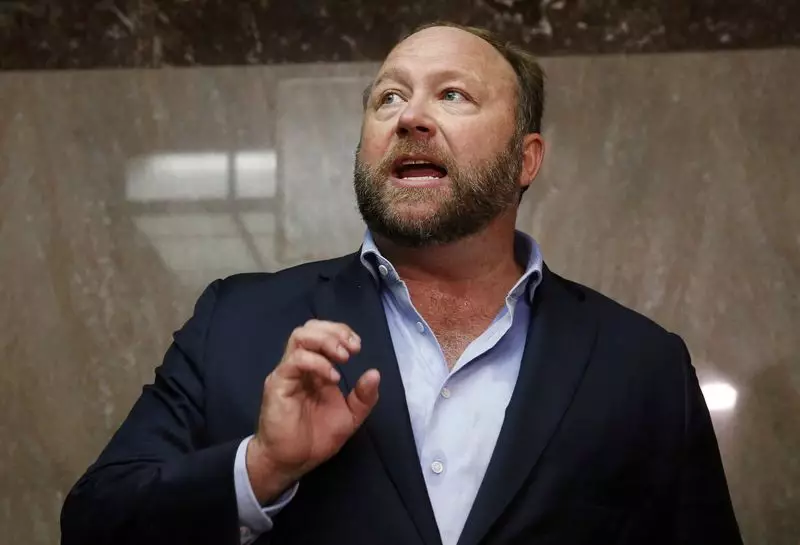The intricacies of bankruptcy law have long captured public interest, not least when they intersect with polarizing figures like Alex Jones. A recent ruling by U.S. Bankruptcy Judge Christopher Lopez highlighted the complexities surrounding the auction process of Jones’ Infowars website, set against a backdrop of significant legal conflicts and public scrutiny. This article delves into the nuances of the ruling, the bidding controversy, and the broader implications for those involved, particularly in light of the interactions among the key stakeholders.
In November, the comedy-focused news site The Onion emerged as the winning bid for Infowars, a platform long associated with conspiracy theory propagation, following Jones’ declaration of bankruptcy amid staggering financial liabilities. The figure of $3.5 million was put forth by First American United Companies, an entity linked to Jones’ supplement-selling ventures, leading The Onion to be declared the victor through its unique bidding strategy and strategic alliances with creditors. This auction raised pressing questions about the nature of fair bidding in the context of a bankruptcy auction, particularly concerning the inclusivity of the process.
During a two-day hearing, Judge Lopez scrutinized the auction’s legitimacy, ultimately ruling against Jones’ allegations of collusion. However, he identified a “good-faith error” on the part of the court-appointed trustee, who hastily concluded the bidding without sufficient negotiation or continued engagement among potential buyers. The judge’s decision to acknowledge that the auction could have yielded a larger sum for the creditors underscores the potential financial shortfall that remains concerning Jones’ enormous debts.
Lopez’s insistence on reconsidering the auction process reflects a protective stance toward creditor interests, emphasizing that neither offer was adequate when juxtaposed against the $1.3 billion in judgments against Jones resulting from claims by the Sandy Hook families. Thus, his directives further entailed a call for the trustee to address outstanding disputes among creditors before proceeding with a renewed sales effort.
A key element of the dispute rests upon the involvement of the Sandy Hook families, who represent the substantial debts owed by Jones. Their decision to support The Onion’s bid by potentially forgoing some repayment allowed the Onion’s offer to be evaluated at a much higher value, complicating the perceptions of fairness in the bidding landscape. The families’ sacrifices underscore the moral high ground they are navigating as they pursue accountability for the infliction of harm stemming from Jones’ actions.
Jones’ legal counsel criticized this strategy as being fueled by “smoke and mirrors,” casting doubt on the legitimacy of The Onion’s financial position in the auction process. The discussion surrounding the credibility of the bids raises fundamental questions about the integrity of auctions conducted under bankruptcy laws, challenging the existing standards that govern them.
The reaction from both sides paints a picture of a divided outcome: Jones celebrated the decision as a tactical victory, while The Onion expressed disappointment yet reaffirmed their commitment to acquiring Infowars. The satirical company envisions transforming the infamous platform into a parody site aimed at reducing the hate and misinformation that characterized its previous iterations. This juxtaposition of intentions demonstrates a rare collision of serious social responsibility with comedic critique, leaving audiences to ponder the ethical implications of such a transformation.
Chris Mattei, representing the Sandy Hook families, offered insight into the broader emotional and moral context of the ruling, emphasizing the resilience of the families against a backdrop of countless obstacles. His statement underscores the enduring struggle for justice and accountability that transcends the immediacy of financial recompense.
The ruling and its implications signal a crucial juncture not only for Alex Jones and his associated businesses but also for the broader discourse surrounding misinformation, accountability, and the preservation of truth in media. As the auction process is revisited and stakeholders navigate the murky waters of bankruptcy law, it remains clear that the complexities are far-reaching. This judicial scrutiny sheds light on the ethical expectations placed upon media entities, even in their commercial pursuits, and poses a critical inquiry into how society engages with figures like Jones and the legacy of harm associated with their platforms. As events continue to unfold, observers will be keenly watching how this legal saga evolves and what it ultimately means for accountability in both individual and collective contexts.

